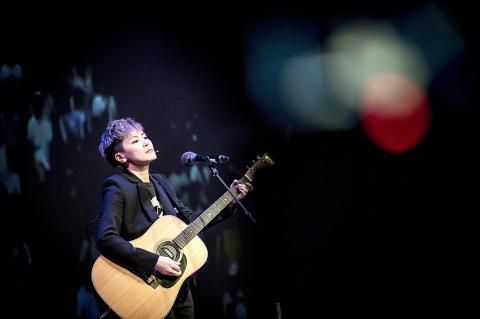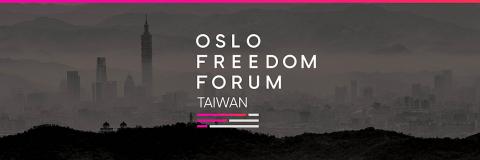For the second year running, the US-based Human Rights Foundation is bringing the Oslo Freedom Forum to Taiwan for a one-day event centered on democracy and human rights.
Founder Thor Halvorssen, who will make his first visit to Taiwan for the forum next Friday, invited Taiwan to “unify and use even more creative methods to call for democratic freedoms.”
Alex Gladstein, chief strategy officer for the foundation, called upon people to be more sensitive to democracy and freedoms “especially in the age of digital information,” and to avoid letting disinformation affect democratic elections.

Photo courtesy of the Human Rights Foundation
As the only edition of the Oslo Freedom Forum held outside of Norway, this year’s forum assembles an impressive roster of grassroots activists and political influencers with ties to Asia.
Cantopop diva Denise Ho (何韻詩) has become better known for her fiery LGBTQI and pro-democracy activism in recent years. Her vocal support for the Umbrella movement in 2014 saw her blacklisted in China, but she continues to be active in ongoing protests in the financial hub.
At the flagship Oslo Freedom Forum in Norway earlier this year, the Hong Kong-Canadian singer’s speech on “creative dissent” during the Umbrella movement ended with a rousing song about the hopes and fears of democracy activists.

Photo courtesy of the Human Rights Foundation
She will perform at the forum’s opening, with Minister Without Portfolio Audrey Tang (唐鳳) set to deliver the opening address.
The forum continues to celebrate the work of journalists illuminating developments in parts of the world where democracy is under siege.
They include American journalist Melissa Chan, whose reporting from China for Al Jazeera English earned her an expulsion from the country in 2012, and Yang Yuan (楊緣), Financial Times technology correspondent based in China.
Esther Htusan, a Kachin reporter from Myanmar, was part of a team that won a Pulitzer Prize in 2016 for their reporting on forced labor and human rights violations in Southeast Asia’s fishing industry. She is expected to address the failed promises of democratization in her country.
North Korean defectors Thae Yong-ho — the country’s former deputy ambassador to the UK and one of its highest-ranking officials to defect — and Park Yeon-mi — who escaped at the age of 14 — will continue to train a spotlight on human rights abuses in the secretive state.
In conjunction, attendees are encouraged to bring unwanted USB drives and SD cards for the HRF’s Flash Drives for Freedom campaign. The flash drives are used to smuggle South Korean and Western movies, books, Wikipedia articles and television shows into North Korea.
Student activism in Thailand has a bloody history, especially in association with the Thammasat University massacre in 1976. But Netiwit Chotiphatphaisal has been juggling his studies at Chulalongkorn University with activism for education reform and against rule by military junta.
Other speakers include Audrey Mbugua, a Kenyan transgender activist and Molly McKew, a specialist on information warfare. Boston Celtics player Enes Kanter, who hails from Turkey, where he has been censured for criticism of strongman President Recep Tayyip Erdogan, will also meet audiences through a video link.
Aside from presentations by the speakers, participants will also have an opportunity to attend networking sessions with other activists and advocates.
■ Sept. 13, from 8am to 6pm at Grand Hyatt Taipei (台北君悅酒店), 2, Songshou Rd, Taipei City (台北市松壽路2號)
■ Conference passes at US$19.21 are available until Sep. 9 at: bit.ly/2YeLKJR

April 14 to April 20 In March 1947, Sising Katadrepan urged the government to drop the “high mountain people” (高山族) designation for Indigenous Taiwanese and refer to them as “Taiwan people” (台灣族). He considered the term derogatory, arguing that it made them sound like animals. The Taiwan Provincial Government agreed to stop using the term, stating that Indigenous Taiwanese suffered all sorts of discrimination and oppression under the Japanese and were forced to live in the mountains as outsiders to society. Now, under the new regime, they would be seen as equals, thus they should be henceforth

Last week, the the National Immigration Agency (NIA) told the legislature that more than 10,000 naturalized Taiwanese citizens from the People’s Republic of China (PRC) risked having their citizenship revoked if they failed to provide proof that they had renounced their Chinese household registration within the next three months. Renunciation is required under the Act Governing Relations Between the People of the Taiwan Area and the Mainland Area (臺灣地區與大陸地區人民關係條例), as amended in 2004, though it was only a legal requirement after 2000. Prior to that, it had been only an administrative requirement since the Nationality Act (國籍法) was established in

With over 80 works on display, this is Louise Bourgeois’ first solo show in Taiwan. Visitors are invited to traverse her world of love and hate, vengeance and acceptance, trauma and reconciliation. Dominating the entrance, the nine-foot-tall Crouching Spider (2003) greets visitors. The creature looms behind the glass facade, symbolic protector and gatekeeper to the intimate journey ahead. Bourgeois, best known for her giant spider sculptures, is one of the most influential artist of the twentieth century. Blending vulnerability and defiance through themes of sexuality, trauma and identity, her work reshaped the landscape of contemporary art with fearless honesty. “People are influenced by

The remains of this Japanese-era trail designed to protect the camphor industry make for a scenic day-hike, a fascinating overnight hike or a challenging multi-day adventure Maolin District (茂林) in Kaohsiung is well known for beautiful roadside scenery, waterfalls, the annual butterfly migration and indigenous culture. A lesser known but worthwhile destination here lies along the very top of the valley: the Liugui Security Path (六龜警備道). This relic of the Japanese era once isolated the Maolin valley from the outside world but now serves to draw tourists in. The path originally ran for about 50km, but not all of this trail is still easily walkable. The nicest section for a simple day hike is the heavily trafficked southern section above Maolin and Wanshan (萬山) villages. Remains of